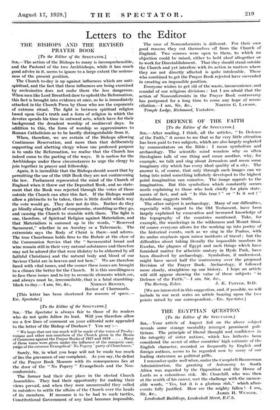Letters to the Editor
THE BISHOPS AND THE REVISED PRAYER BOOK
[To the Editor of the SPECTATOR.] -
Sia,—The action of the Bishops to many is incomprehensible, and the Pastoral of the two Archbishops, while it has much good advice in it, seems to ignore to a large extent the serious- ness of the present position.
The Church to-day is up against influences which are anti- spiritual, and the fact that these influences are being exercised by ecclesiastics does not make them the less dangerous.
When men like Lord Brentford dare to uphold the Reformation, this fact is brought into evidence at once, as he is immediately attacked in the Church Press by those who are the exponents of extreme ritual. The fight is between spiritual religion based upon God's truth and a form of religion in which the devotee spends his time in outward acts, which have for their background the decadent worship of mediaeval days. In addition to this, the form of worship so approximates to Roman Catholicism as to be hardly distinguishable from it. When, therefore, we see certain of the Bishops allowing Continuous Reservation, and more than that deliberately supporting and abetting clergy whose one professed purpose is to undo the Reformation, we realise that the Church has indeed come to the parting of the ways. It is useless for the Archbishops under these circumstances to urge the clergy to join together in prayer and fellowship.
Again, it is incredible that the Bishops should assert that by permitting the use of the 1928 Book they are not contravening the law. Parliament represented the mind of the Church of England when it threw out the Deposited Book, and no state- ment that the Book was rejected through the votes of those outside the Church can alter this fact. If the Bishops would allow a plebiscite to be taken, there is little doubt which way the vote would go. They dare not do this. Rather do they go blindly along the path of compromise, stumbling as they go, and causing the Church to stumble with them. The fight is one, therefore, of Spiritual Religion against Materialism, and that Materialism is summed up in the words, " Reserved Sacrament," whether in an Aumbry or a Tabernacle. The extremists says the Body of Christ is there—and adores. The true Churchman holds firm to the Rubric at the close of the Communion Service that the " Sacramental bread and wine remain still in their very natural substances and therefore may not be adored (for that were idolatry to be abhorred by all faithful Christians) and the natural body and blood of our Saviour Christ are in heaven and not here." We are therefore faced with vital issues, and the sooner these issues are brought to a climax the better for the Church. It is this unwillingness to face these issues and to try to reconcile elements which are, and always must be, irreconcilable, that is a fatal stumbling- block to-day.—I am, Sir, &c., NORM-AN BENNET, Rector of Charmouth.
[This letter has been shortened for reasons of space.— En. Spectator.]
































 Previous page
Previous page